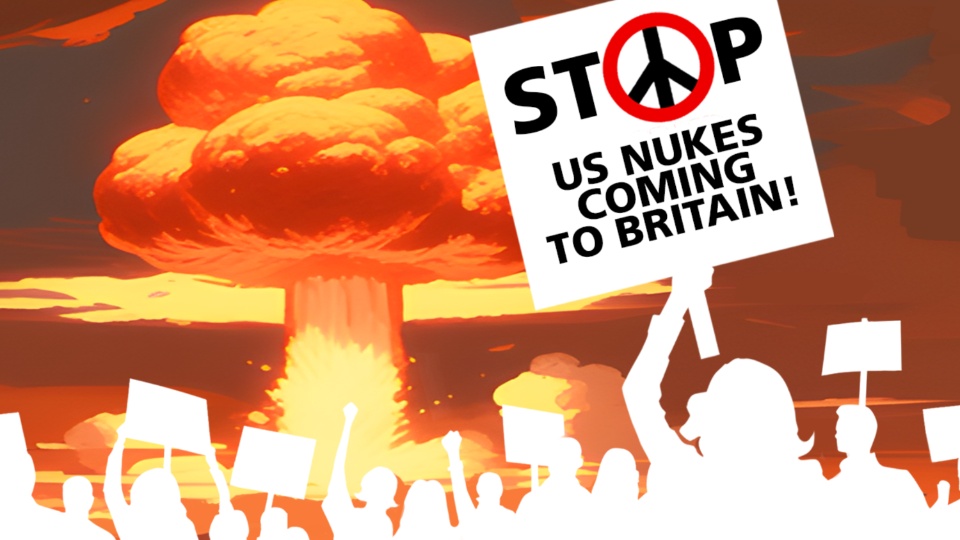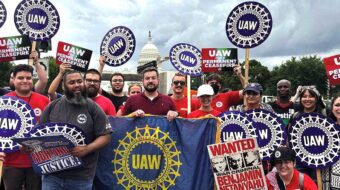
It has become widely understood that there will now be a renewed stationing of U.S. nuclear weapons on British soil.
There are multiple reasons for opposing this plan, not least on the grounds of democracy. But the most important reason is that at a time of increased conflict in Europe, stationing nuclear weapons in Britain and other European countries makes us more vulnerable to attack, not less.
How this U.S. decision came to light is itself instructive about the entire process. It was revealed by scientists and campaigners and has only recently been aired in the British press.
In effect, the U.S. Congress has been indirectly informed of the decision because of the federal government’s budget requests for “surety dormitories,” which are understood to mean accommodation for services personnel tasked with protecting nuclear weapons.
But for a government that has made such a hue and cry about the need to protect Britain’s sovereignty, no such information has been provided to the British Parliament.
The U.K. government has no plans to offer a debate on the issue, and it is highly likely that their stock response to all inquiries is that it is not their policy to comment on matters of national security.
But we do not need commentary. We need accountability.
Prime Minister Rishi Sunak came to office, unelected, promising both greater transparency and accountability. There could hardly be a more serious matter on which both were needed.
Yet the implementation of U.S. policy in this sphere has been shrouded in British secrecy. It is a complete indictment of this government that the U.S. Congress knows more about the deployment of nuclear missiles here than the British Parliament.
The intention is to locate the new nuclear weapons at Lakenheath in Suffolk. Like many others, it is labeled as a [U.K.] Royal Air Force base but is in fact wholly controlled and run by U.S. military personnel and under its command. For all intents and purposes, it is a U.S. Air Force base.
This means the base is effectively a part of the U.S. military and nuclear network, not a British one.
If there are no objections raised, it will mean that Britain is once again a forward nuclear base for the U.S. in Europe. It also means that Britain becomes a crucial target in any U.S. conflict in which nuclear weapons are used, or even threatened. It cannot possibly add to our safety.
All of this is taking place at a time of the most sustained fighting in Europe since the end of the Second World War.
Lakenheath will be home to a new, laser-guided nuclear bomb, along with bases in five other European countries. This is a recipe for escalation of current and future conflicts, with potentially disastrous consequences.
When Vladimir Putin announced the deployment of Russian nuclear weapons in Belarus, the justification he offered was the existing presence of U.S. nuclear weapons in Europe. Clearly, the deployment of U.S. nuclear weapons in a number of European countries risks further escalation of weaponry and of tensions on both sides.
The traditional claims that nuclear weapons aid our security, that they are somehow a “nuclear umbrella,” have little merit. Nuclear weapons are wholly offensive weapons.
The claims that they are somehow a deterrent to wars in Europe and many other parts of the world are equally specious. If the deterrent argument were really valid, then logically we should advocate their adoption by all countries. It is clearly nonsense.
Instead, the nuclear powers and others struggle to limit the greater deployment of nukes, and Britain among others is a signatory to nuclear non-proliferation treaties.
If “rogue states” should not be allowed to possess nuclear weapons and all nuclear weapons powers should reduce them, which Britain has agreed to, how is it justifiable to increase U.S. nukes here?
This is from a country which has had Donald Trump as president and may have him once again.
The deployment clearly undermines our safety. It does not add to it. This underpinned the finding of a very recent YouGov poll at the end of August. Just 23% of voters support the deployment, and 59% oppose it.
This overwhelming popular opposition to U.S. nukes in Britain simply reinforces how undemocratic the decision-making process has been.
Either the government and its supporters have completely ignored public opinion on this vital matter, or the U.S. has simply dictated its decision to its European allies. Perhaps it is some combination of the two.
In any event, the British public should be informed of these plans and offered the obvious alternative.
That alternative is the progressive de-nuclearization of British military and foreign policy. The overwhelming majority of countries in the world do not have nuclear weapons. Yet the idea that they are more at risk than this country is plainly ridiculous. Their populations are safer without them.
I know there are many in the labor movement who simply see jobs and pay when weapons deployment or manufacturing are considered. But it was that type of short-term thinking that ultimately led to the first world war.
Deploying these weapons will not create jobs in this country. Instead, they make us all much more vulnerable.
In any case, activists with the Campaign for Nuclear Disarmament (CND) and others have shown on many occasions that money wasted on weaponry is the least jobs-rich type of investment of all. The same money could be far better spent in other areas, where there are also social benefits, such as health, education, housing, or infrastructure and transport.
CND and others have already begun to campaign against this deployment. They deserve to be joined by many more, especially in the labor movement.
The decision to deploy U.S. nuclear weapons is a very dangerous one. It seems most likely that it was made in the U.S. It has certainly only been disclosed there.
New nuclear weapons at Lakenheath risk further escalation of threat and countermeasure, when we are already deeply involved in war in Europe.
The British government has not been straight with the British people. These types of decisions are of the utmost seriousness. Yet ministers want to hide behind a cloak of secrecy.
The reason for secrecy is that this decision benefits the U.S. while putting people in this country at greater risk. It is no surprise that it is extremely unpopular with the British people. We should aim to turn that opposition into real campaigning action, to stop the U.S. nukes.
As with all op-eds published by People’s World, this article reflects the opinions of its author.
We hope you appreciated this article. At People’s World, we believe news and information should be free and accessible to all, but we need your help. Our journalism is free of corporate influence and paywalls because we are totally reader-supported. Only you, our readers and supporters, make this possible. If you enjoy reading People’s World and the stories we bring you, please support our work by donating or becoming a monthly sustainer today. Thank you!












Comments